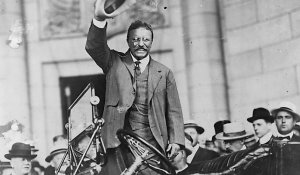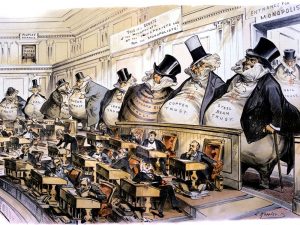We knew it was coming. America’s powerful big tech monopolies moved over the weekend to silence conservative voices and online platforms.
The first casualty in this war of words was Parler—a place where conservative Americans went when they found their commentaries censored by Facebook, Twitter, Google, and other social media outlets.
Parler’s fate was sealed when Amazon’s AWS unit stopped providing Parler with cloud services and Apple and Google booted the network out of its app stores.
“We are now living in a country where four or five companies, unelected, unaccountable, have the monopoly power to decide, we’re gonna wipe people out, we’re going to erase them, from any digital platform, whether it’s selling things and the like,” Sen. Marco Rubio, R-Fla., said. “The social media industry’s sway over public conversation is too great.”
That’s what the U.S. Congress thought in the late 1800s and early 1900s when it passed antitrust laws designed to break up monopolies and trusts in the railroad, oil, steel, and sugar industries—all of which were found to be restraining trade and manipulating markets.
One of the classic trusts was the Standard Oil Company, which bought its rivals or established business arrangements that effectively stifled competition. Other companies in other industries followed the model of Standard Oil, which organized itself as a trust in which several component corporations were controlled by one board of directors.
In 1890 Congress passed the Sherman Antitrust Act to provide some federal regulation of trusts. Despite the Sherman Antitrust Act, by 1902, the 100 largest corporations held control of 40 percent of industrial capital in the United States.
One of the most egregious trusts was the American Sugar Refining Company, which was taken to court for controlling approximately 98% of the US sugar trade. In 1895, just 5 years after passing the Sherman Act, US courts ruled in favor of the American Sugar Refining Company and refused to dissolve its hold over the industry.

However, when President Theodore Roosevelt took office in 1901, all of that changed. In 1902, Roosevelt revived the Sherman Act by suing J. P. Morgan’s Northern Securities Company, a railroad trust that controlled the Great Northern Railway; Northern Pacific Railway; and the Chicago, Burlington, and Quincy Railroad. The court decision broke the conglomerate.
“Where a trust becomes a monopoly the state has an immediate right to interfere,” Roosevelt said.
In 1903, Roosevelt worked closely with Congress to establish the Elkins Act, which made it illegal for railroad companies to provide discounts to large farming establishments. These discounts made it difficult for smaller farming enterprises to take part in railroad services and the act served to make that access more equal across the board.
An examination of social media companies today reveals a similar pattern of monopolization.
The late Jack Welch, legendary CEO of General Electric and still considered by many to be the ultimate business guru, once offered this simple formula for success: “Number one, cash is king… number two, communicate… number three, buy or bury the competition.”
Social media companies like Facebook and the other monopoly-minded tech giants like Google, Amazon, and Twitter, have taken Welch’s advice to heart.
Even before Big Tech’s recent censorship of public discourse and its take-down of Parler, the hammer was threatening to fall on Google and Facebook. Both social media platforms are being sued by the U.S. Federal Trade Commission and nearly every U.S. state. The suits charge that both companies use a ‘buy or bury’ strategy to snap up rivals and keep smaller competitors at bay.
While stifling competition by crushing or buying up small competitors is bad enough, I am more concerned with what these monoliths are doing to free speech and public discourse in our country.
They see the First Amendment of the Constitution as something to be ignored, even spat upon. In what may prove to be a violation of the First Amendment, every social media company has suspended President Donald Trump’s accounts either temporarily or permanently in the aftermath of the attack on the U.S. Capitol building.
Additionally, payment processing company Stripe cut ties with Trump’s campaign while Twilio, Okta, and other tech companies stopped providing services to Parler. Reddit banned the subreddit r/DonaldTrump while Twitch disabled Trump’s channel. Shopify took down two online stores affiliated with Trump.
What’s next?
“Right or wrong, they made a political decision,” said Jonathon Hauenschild, director of the communications and technology task force for the American Legislative Exchange Council. “Attention on the tech giants was there, to begin with. Now the spotlight is fully on.”
The question is whether or not a Biden Administration and a Democrat-controlled Congress will take the steps necessary to rein in the social media giants.
It’s possible Big Tech and Social Media censorship will come under more scrutiny if Congress turns its attention to Section 230 – the part of U.S. law that grants broad protections to platforms for user-generated content. President-elect Joe Biden has previously said he wants to repeal Section 230.
In the meantime, Parler has fired back at Amazon with a lawsuit alleging Amazon violated anti-trust laws and breached its contract by suspending the Parler app. The suit charges that Amazon is using a politically-motivated double standard compared to its treatment of other mainstream social networks like Twitter.
Amazon alleges Parler was not doing enough to remove posts that incite violence. Since then, Amazon’s stock has fallen as investors remain concerned over Big Tech’s allege bias. Twitter shares have also taken a nosedive after the app moved to permanently ban President Trump from the platform.
Meanwhile, Parler CEO John Matze says the network may be down longer than expected because “Most people with enough servers to host us have shut their doors to us.”
Where is Teddy Roosevelt when we need him?



